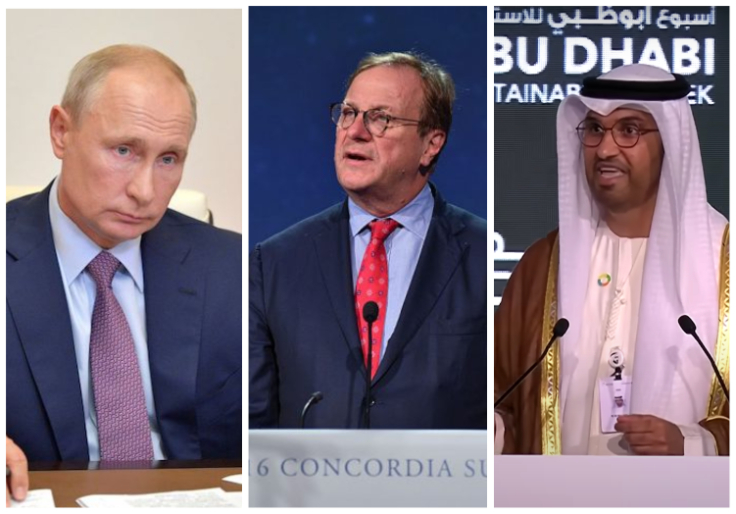The Atlantic Council has positioned itself as one of the Beltway’s most vocal critics of Russia’s invasion of Ukraine. But one of its biggest donors is snatching up a massive amount of discounted Russian oil, fueling what the prominent think tank has called "Russia’s war machine."
The United Arab Emirates, through its national oil companies, has purchased hundreds of thousands of barrels of discounted Russian oil, the Wall Street Journal reports. The relationship has frustrated American officials but proved lucrative for the Emiratis, who have been able to turn the Kremlin crude for a handsome profit on the world market.
These profits will likely benefit the Atlantic Council, which has urged foreign governments to boycott Russian energy to avoid funding Russian president Vladimir Putin’s "war machine" and "war crimes." Abu Dhabi National Oil Co., which recently stored 700,000 barrels of oil for Russia’s Gazprom, is a major sponsor of the Atlantic Council’s Gulf Energy Forum. The UAE embassy in 2021 gave more than $1 million to the Atlantic Council, while the UAE's Ministry of Foreign Affairs and International Cooperation gave between $100,000 and $250,000, according to donor records.
The UAE’s oil deals could make things awkward for the Atlantic Council, which has been at the forefront of calls for aggressive steps to thwart Russia with economic sanctions. In a memo to NATO leaders this month, the Atlantic Council said that "a failure to fully exercise the West’s economic leverage risks prolonging this conflict by fueling Putin’s war machine." Atlantic Council senior fellows called for sanctions on the purchase of Russian oil in order to "stop funding Russia’s war machine" and urged Europe to halt energy purchases from Russia to "stop funding Vladimir Putin’s war crimes in Ukraine."
Atlantic Council president Fred Kempe, writing at CNBC, recently decried Putin’s "weaponization" of the energy industry to fuel his "criminal war in Ukraine." In the op-ed, Kempe touted Sultan Al Jaber, the head of the Abu Dhabi National Oil Co., as an "ideal choice" to lead a United Nations climate conference later this year.
Kempe’s op-ed caused a minor stir in the think tank world after the Washington Free Beacon reported Atlantic Council’s financial ties to UAE, which Kempe failed to disclose. CNBC added an editor’s note to Kempe’s article, saying that the Atlantic Council’s relationship with UAE was "an obvious conflict of interest" that "does not meet our standards of transparency."
It’s the sort of foreign entanglement that has caused headaches for the Atlantic Council before.
The think tank has had a lucrative relationship with the increasingly authoritarian Turkish government. Kempe met with Turkish president Recep Tayyip Erdogan at an event in Washington in 2017 while the Turkish autocrat’s bodyguards were attacking peaceful protesters outside the venue.
Burisma Holdings, the Ukrainian energy company linked to Hunter Biden, paid the Atlantic Council $300,000 as part of an image rehabilitation campaign in 2017. The Atlantic Council entered the partnership even after State Department officials warned the think tank of Burisma’s rampant corruption.
Two Atlantic Council scholars lobbied on behalf of the Russian gas pipeline, Nord Stream 2. Several companies that constructed the pipeline have donated to the Atlantic Council over the years.
The Atlantic Council has helped UAE burnish its image in other ways, even as the oil-rich Gulf nation has faced criticism over its human rights record. Last year, the think tank organized an all-expenses-paid junket for congressional staffers to meet with Emirati officials regarding its efforts to fight climate change.
American officials are increasingly concerned by the Emiratis’ growing ties with Russia. American spies intercepted communications of Russian intelligence officials boasting they had convinced the Emiratis "to work together against US and UK intelligence agencies," the Associated Press reported.
An Atlantic Council spokesman defended the relationship with the Emiratis, saying the think tank's experts maintain "total intellectual independence" from corporate and foreign donors.
